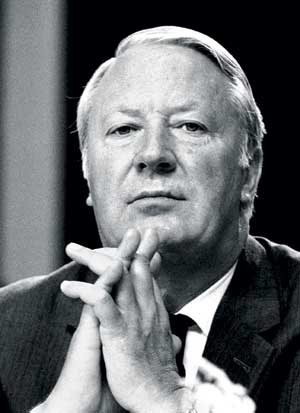Sir Edward Heath dies aged 89

After celebrating his 89th birthday at a party only a week ago, he had become considerably weaker in recent days. Yesterday afternoon his spokesman announced that he was "nearing the end of his life" and he died at 7.30pm in the home he loved with a view of Salisbury Cathedral.
In 2003, Sir Edward fell ill on holiday in Austria. When he was being treated for a minor stomach upset at Salzburg's main hospital, tests revealed that he was suffering from a pulmonary embolism - a blood clot on the lung. He survived after hospital treatment in London, but did not make a full recovery. It is understood he died from old age.
Although he was Prime Minister for less than four years in 1970-74, Sir Edward's legacy was arguably greater than some who stayed longer in Downing Street. In 1973, he ended Britain's post-war political isolation from the Continent by taking it into the Common Market, the forerunner of the European Union.
He was an MP for more than 50 years, the first Tory leader from a humble background, and the first to be elected by MPs rather than chosen by the "men in grey suits".
Sir Edward's other place in the history books is less favourable. Amid an oil crisis, pay freeze and three-day week and with the country beset by strikes, he called a "who governs Britain?" general election in February 1974 and suffered a humiliating defeat at the hands of his Labour rival, Harold Wilson.
After losing another election in October 1974, he was ousted as Tory leader the following year by Margaret Thatcher. His defeat provoked one of the longest-running personal feuds in recent political history.
Baroness Thatcher paid glowing tribute last night to the man whose downfall she caused, describing her one-time foe as "a political giant". She added: "He was also, in every sense, the first modern Conservative leader - by his humble background, his grammar school education and by the fact of his democratic election.
As Prime Minister, he was confronted by the enormous problems of post-war Britain. If those problems eventually defeated him, he had shown in the 1970 manifesto how they, in turn, would eventually be defeated. For that, and much else besides, we are all in his debt."
Tony Blair said: "He was a man of great integrity and beliefs he held strongly from which he never wavered. And he will be remembered by all who knew him as a political leader of great stature and significance."
Michael Howard, the Tory leader, said: "Ted Heath was one of the political giants of the second half of the 20th century. He was the last Conservative leader who had served in the Second World War. As Chief Whip, as a senior cabinet minister and, of course, as Prime Minister he made an enormous contribution to the political life of our country. He will always be remembered as a prime minister who took Britain into the European Economic Community, but his achievements went far beyond that. His passing will be mourned far and wide."
He was determined to outlast the Iron Lady who, ironically, implemented some of the trade union laws he proposed in 1971 on a more gradual basis. He achieved that in the Commons, soldiering on as MP for Bexley for more than 50 years. He grumpily dismissed advice from friends to take it easy or take a seat in the House of Lords, a club he always refused to join.
He became father of the House, the longest-serving MP, in 1992, the year he was knighted. He was its oldest member when he stood down at the 2001 general election - nine years after his old foe left the Commons and became Baroness Thatcher.
Robert Key, the MP for Salisbury and Sir Edward's former parliamentary private secretary, said: "When he fell out with Margaret Thatcher I think it was perhaps because they were too alike. It was because they came from similar backgrounds. They were great achievers. They were great competitors. I believe he did mellow to her. He actually knew the battle was over. When she left Downing Street [in 1990] he started relaxing a little."
Mr Key said Sir Edward might be mourned more abroad than in his own country. "It is a sad evening for England because Ted was a great Englishman. He was a great Brit but he was a great Englishman. He loved our country, he loved our Queen, he loved our institutions and he took that love of our country wherever he went in the world."
The former Labour MP Tam Dalyell, who succeeded Sir Edward as father of the House, praised him for not "going cap in hand to Washington". He said: "He stood up to American views and wasn't just enchanted by the White House lawn as so many others were."
Sir Edward was the first Tory from an ordinary background to rise to the party leadership. Born in Broadstairs in Kent, the son of a builder, Sir Edward went to the local grammar school and on to Balliol College, Oxford. In the Army, he rose to the rank of lieutenant-colonel in the Artillery.
His funeral will be held at 2.30pm on Monday 23 July at Salisbury Cathedral.
Join our commenting forum
Join thought-provoking conversations, follow other Independent readers and see their replies
Comments
Bookmark popover
Removed from bookmarks